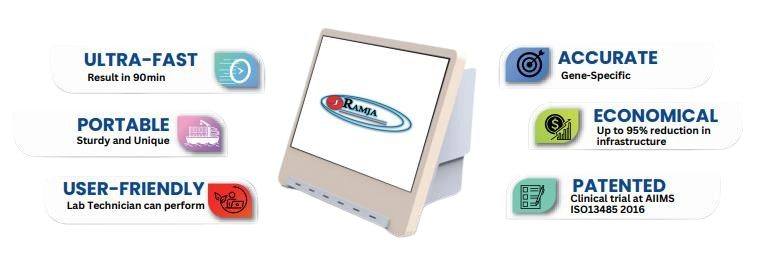


RAMJA GENOSENSOR has developed a fast, simple, and cost-effective solution for all hospitals, laboratories, and remote areas: a noble paper-based system that detects microbial infection and antimicrobial resistance within 90 minutes. Our device is ultrasensitive, gene specific, portable, precise . Unlike existing experiments (2-3 days result waiting) however, the we gives results in less than 90 minutes , saving both lives and money for hospitals. It is cost-efficient than conventional research approaches such as culture and PCR as it can reduce cost, efforts & resources by huge margin.
Infection is a major concern, particularly in the intensive care unit (ICU), where approximately 60-80% of patients develop harmful infections including catheter-related bloodstream infections, ventilator-associated pneumonia, and catheter-associated urinary tract infections. Because of the high infection rates, every single patient in the ICU is screened. Since a one-hour delay in care will raise death rates by up to 16% in vital cases, time is important. Standard detection techniques, on the other hand, require 2-5 days to produce results and physicians are forced to treat the infection with synthetic antibiotics, which does further damage to the patient in terms of antibiotic resistance. Antibiotic resistance is often linked to the excessive use of broad-spectrum antimicrobial agents, with more than 80% of all ICU patients receiving antibiotics during their stay.
Currently, there are over 4-5 techniques available in the world (culture, PCR, MALDI, Sequencing), all of those are time-consuming (2-5 days to get a result), expensive, difficult to execute, and require a team of experts (Scientist, Ph.D., M.D., M.Sc., Technician, 8-10 people). As a result of these current delayed procedures, doctors begin prophylactic antibiotics, causing antibiotic resistance and a high risk of death in ICU and other diseases in patients. So, for a country like India, we need a solution that is fast, gene specific, culture independent, cost-effective, and user-friendly, and that can have a quick outcome for patients while reducing the risk of death from sepsis and Multiple organ dysfunction syndrome (MODS).
RAMJA GENOSENSOR is a Med-Tech Indian Company that offers highly accurate and innovative paper-based technology for the detection of microbial infection and antibiotic resistance. Our team at RAMJA GENOSENSOR has developed INDIA’s first Paper Biosensor-based microbial infection and antibiotic susceptibility device - PRATHAMASENSE, that can produce results in 90 minutes, which is cost-effective in terms of setup and can be performed at room temperature on a table, reducing infrastructure costs.

F-89/7, 2nd Floor UNIT NO-2, Pocket F,
Okhla Phase I, Okhla Industrial Estate,
New Delhi, Delhi 110020
011 4446 9753